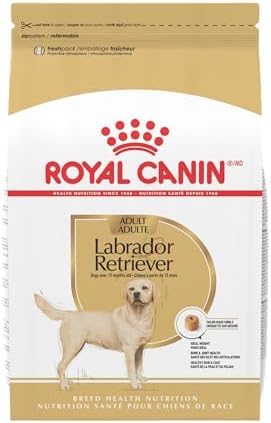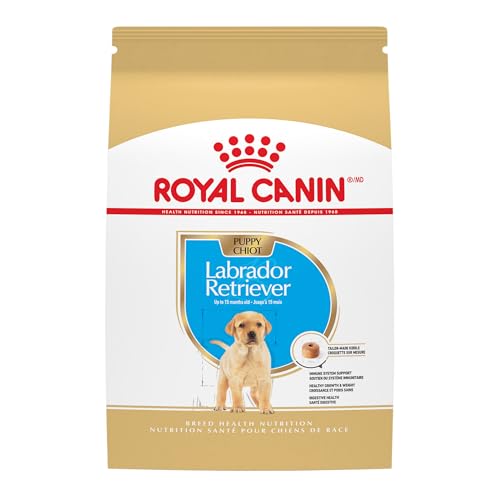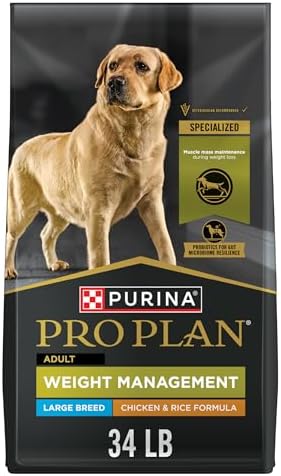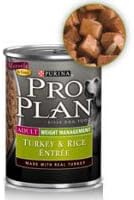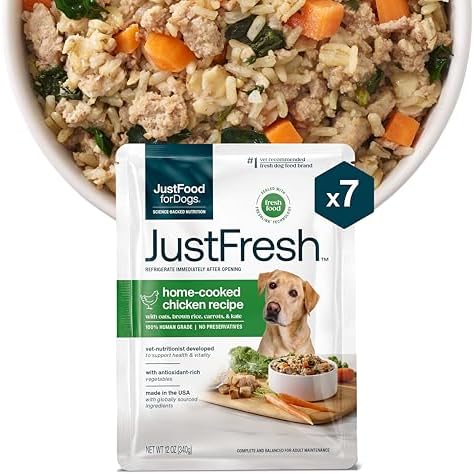If you share your life with a Labrador, you already know how much energy and love they bring into every day. But what many new owners don’t realize is that this breed has very specific nutritional needs. Choosing the best dog food for Labrador Retrievers isn’t just about filling the bowl—it’s about supporting their active lifestyle, protecting their joints, and keeping that trademark sparkle well into their senior years.
In this guide, we’ll break down why Labs need a special diet and how the right food can help them stay healthy, strong, and happy at every stage of life.
Our Top Picks at a Glance
| Product | Best For | Key Feature | CTA |
|---|---|---|---|
| Royal Canin Labrador Retriever | Breed-Specific Needs | Donut-shaped kibble slows eating | Check Price on Amazon |
| Hill’s Science Diet Large Breed | Vet-Trusted Reliability | WSAVA recommended research | Check Price on Amazon |
| Purina Pro Plan Large Breed | Variety & Sensitivities | Probiotics for digestion | Check Price on Amazon |
| The Farmer’s Dog | Ultimate Freshness | Human-grade, pre-portioned meals | Check Price on Amazon |
| Blue Buffalo Life Protection | Natural Ingredients | “LifeSource Bits” for antioxidants | Check Price on Amazon |
Why Labrador Retrievers Need a Special Diet
Labrador Retrievers are one of America’s most popular dogs, but this breed has unique nutritional needs that go beyond a “one-size-fits-all” food plan.
Energetic and Muscular Build
Labs were originally bred as working dogs, and their energetic, muscular build means they burn through a lot of calories. To fuel this lifestyle, they thrive on high-protein dog food for Labradors that supports strong muscles and steady energy. Real meat sources like chicken, turkey, or salmon provide the essential amino acids they need for growth and repair.
Predisposition to Obesity & Joint Problems
Here’s the flip side: Labradors are genetically unique. Many carry a gene mutation (POMC) that affects their appetite regulation, making them feel hungry even when they’ve eaten enough. This is why so many Labs become overweight. Extra pounds put enormous pressure on their hips and elbows, which are already prone to joint problems like dysplasia and arthritis. Keeping your Lab at a healthy weight is like giving them extra years of pain-free play.
Importance of Breed-Specific Nutrition
Not every large-breed food meets the unique needs of a Labrador. Breed-specific diets matter because they often use kibble shapes that slow down fast eaters, balance protein and fat to maintain lean muscle, and include Labrador joint health supplements in food like Omega-3 fatty acids for inflammation control.
By paying attention to these needs, you’ll not only meet AAFCO standards for complete nutrition but also follow science-based guidelines recommended by groups like the World Small Animal Veterinary Association (WSAVA).
Labrador Retriever Nutrition Essentials
The best dog food for Labrador Retrievers balances several key components. Let’s break them down.
- Protein: Building Strong Muscles Labs are athletic and need high-protein dog food for Labradors to fuel their muscles. Look for real animal proteins like chicken, beef, or salmon as the first ingredient.
- Healthy Fats: Energy & Shiny Coats Fats give Labradors concentrated energy and keep their coats glossy. Omega-3s from salmon oil and Omega-6s from poultry fat are crucial for reducing inflammation and keeping joints flexible.
- Carbohydrates: Choosing Whole-Food Sources Whole-food sources like brown rice, oats, or sweet potatoes provide steady energy and important fiber. Unless your dog has a true grain allergy (which is rare), wholesome grains are safe and beneficial.
- Vitamins & Minerals for Long-Term Health Look for foods labeled “complete and balanced” by AAFCO standards, which means they provide the full range of micronutrients for strong bones, good vision, and immune defense.
- Fiber & Hydration for Weight Control Because of their genetic predisposition to hunger, fiber is key to helping Labs feel full without overeating. Hydration is just as important; fresh food has a much higher moisture content than kibble, aiding digestion and kidney health.
Best Dog Food by Life Stage
A Lab’s needs change from puppyhood to adulthood and into their senior years.
Best Puppy Food for Labrador Retrievers
Growing Labs need more protein, calories, and specific nutrients like DHA for brain and eye development. However, their food must control calcium and phosphorus to avoid stressing their developing bones and joints. Always look for Labrador Retriever puppy food recommendations that specify “large breed puppy” on the label. Avoid “all life stages” foods, as they often have too much calcium, which can increase the risk of hip dysplasia.
Best Adult Food for Labrador Retrievers
Once a Lab reaches adulthood, the focus shifts to weight management and maintaining lean muscle. The best formulas balance high protein with moderate fat and added joint support. If your Lab is gaining weight, consider switching to a Labrador Retriever weight management diet with higher fiber to help them feel full without excess calories.
Best Senior Food for Labrador Retrievers
Older Labs slow down but still need high-quality protein to protect against age-related muscle loss. Senior foods focus on easy-to-digest ingredients, robust joint support, and fewer calories. Look for formulas with added antioxidants and therapeutic levels of Labrador joint health supplements in food.
Managing Labrador Health Concerns Through Diet
The best dog food for Labrador Retrievers can help prevent or ease common health issues.
- Obesity Prevention and Portion Control: Because of their genetic quirk, portion control is non-negotiable. Choose a Labrador Retriever weight management diet with moderate calories and higher fiber. Always measure meals with a cup, and avoid free-feeding (leaving food out all day), which almost always leads to obesity in this breed.
- Joint Support (Glucosamine, Omega-3s): Labs are prone to arthritis. Supporting their joints through nutrition is one of the smartest moves you can make. Look for foods that include glucosamine, chondroitin, and Omega-3 fatty acids from fish oil, which are natural anti-inflammatories.
- Food Allergies and Sensitivities: Some Labs develop itchy skin or digestive upset. Most cases are related to proteins like chicken or beef, not grains. If you suspect an issue, try a limited-ingredient or novel protein diet (like salmon or lamb).
Comparing Different Dog Food Types
- Dry Kibble vs. Wet Food: Kibble is affordable, convenient, and helps control tartar. Wet food is great for hydration and picky eaters but is more expensive. Many owners use it as a topper.
- Fresh Food Subscriptions (The Farmer’s Dog, Ollie): These services deliver gently cooked, human-grade meals. They are highly digestible and pre-portioned, which is excellent for weight management, but they come at a higher cost and require freezer space.
- Raw Diets: While some owners report benefits, raw feeding carries a significant risk of bacterial contamination (like salmonella) for both dogs and humans. It is also very difficult to balance nutritionally without expert guidance.
- Grain-Inclusive vs. Grain-Free: Unless your vet confirms a grain allergy, wholesome grains are perfectly safe. The FDA has investigated a potential link between some grain-free diets high in legumes and heart issues, leading many vets to recommend balanced, grain-inclusive foods.
The 5 Best Dog Food Brands for Labrador Retrievers (Reviews)
Here are the top picks that combine scientific research, balanced nutrition, and positive feedback.
Just so you know: As a dedicated dog owner myself, I only recommend products I truly believe in. If you purchase through a link on this page, I may earn a small commission that helps me create more in-depth guides like this—at no extra cost to you. I really appreciate your support!
(Learn More)
1. Royal Canin Labrador Retriever Adult
This formula is designed specifically for the breed. The donut-shaped kibble slows down fast eaters, a lifesaver for Labs. It contains moderate fat and includes glucosamine and Omega-3s for joint health.
- Pros: Breed-specific, weight-friendly, supports healthy joints.
- Cons: Pricier than generic kibble, uses by-product meals.
2. Hill’s Science Diet Large Breed Adult
Backed by decades of veterinary research, this formula balances protein, fat, and healthy grains. It also contains glucosamine and chondroitin, making it a reliable choice for dogs prone to arthritis.
- Pros: Vet-trusted, meets AAFCO standards, easy on digestion.
- Cons: Some picky eaters may not love the flavor.
3. Purina Pro Plan Large Breed Formulas
Purina Pro Plan offers flexibility with multiple recipes, from chicken-based kibble to salmon formulas for sensitive skin. The brand includes probiotics for digestion and maintains a strong protein base, making it a top high-protein dog food for Labradors.
- Pros: Variety of recipes, supports digestion and muscle health.
- Cons: Quality can vary between formulas, so read the label.
4. The Farmer’s Dog Fresh Food
This fresh subscription service sends pre-portioned meals tailored to your dog’s needs. Recipes use human-grade ingredients, and the gentle cooking process makes nutrients easy to absorb.
- Pros: Highly digestible, excellent for seniors, portion-controlled.
- Cons: Much more expensive than kibble, needs freezer space.
5. Blue Buffalo Life Protection Formula Large Breed
Blue Buffalo is a leader in the natural dog food category, and their Life Protection Formula is a favorite among owners who prioritize whole-food ingredients. This recipe features deboned chicken as the first ingredient and contains no corn, wheat, or soy. Its standout feature is the inclusion of “LifeSource Bits”—a precise blend of antioxidants, vitamins, and minerals that support immune system health.
- Pros: Real meat is the first ingredient, no corn, wheat, or soy, includes antioxidant-rich “LifeSource Bits,” contains glucosamine for joint support.
- Cons: Can be more expensive than other kibbles, some dogs with very sensitive stomachs may find the rich formula hard to digest.
Feeding Guide & Practical Tips
- Reading Dog Food Labels: Check that the food meets AAFCO standards and lists a real animal protein first. Look for at least 22-26% protein for adult Labs.
- Portion Control & BCS: Most adult Labs eat 2-3 cups of kibble daily, split into two meals. Use the Body Condition Score (BCS): you should be able to feel their ribs but not see them, and they should have a visible waist.
- Transitioning Foods Safely: Switch foods gradually over 7-10 days to avoid stomach upset.
- Healthy Treats: Treats should be no more than 10% of daily calories. Carrots or apple slices are great options.
Frequently Asked Questions (FAQs)
1. What is the best food for a Labrador puppy?
Look for Labrador Retriever puppy food recommendations that specify “large breed” to ensure controlled growth and prevent joint stress.
2. How much should I feed my adult Labrador daily?
Typically 2-3 cups of kibble, split into two meals. Adjust based on activity level and use the Body Condition Score to prevent weight gain.
3. Are grain-free diets safe for Labradors?
Unless your vet diagnoses a grain allergy, balanced grain-inclusive recipes are generally considered a safer choice due to the ongoing investigation into grain-free diets and heart health.
4. Which foods help Labradors with sensitive stomachs?
Gently cooked fresh foods like The Farmer’s Dog, or kibble formulas made with novel proteins like salmon, can ease digestion.
Conclusion: Choosing the Right Food for Your Labrador
Ultimately, the best dog food for Labrador Retrievers is one that keeps your dog active, at a healthy weight, and excited for mealtime. Always consult your vet before making a major diet change, as they know your dog’s health history best. By balancing science, quality, and your budget, you can provide a diet that helps your Lab live a long, joyful life with you.
5. Do Labradors need joint supplements in their diet?
Yes, it’s highly recommended. Look for formulas that already include Labrador joint health supplements in food, like glucosamine and Omega-3s, to protect their hips and elbows.
Send Us a Message
For all other inquiries, please use the form below. We look forward to hearing from you!

